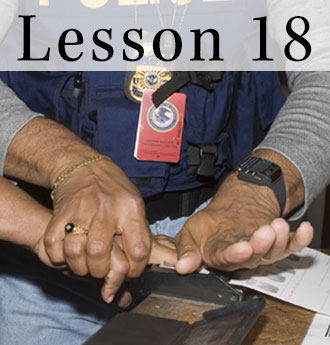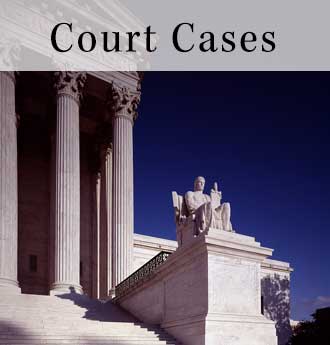Lesson 18: How Has the Due Process Clause of the Fourteenth Amendment Changed the Constitution?
What is due process of law and where did the idea come from? (Video)
Origins of the concept of due process of law; evolution of meaning of the concept; elements of definition; inclusion in Fifth and Fourteenth Amendments; prohibition of deprivation of life, liberty, or property without due process of law; Fifth Amendment only limits national government; Fourteenth Amendment extends Fifth Amendment limitations to states; essential elements of due process; due process in criminal and civil proceedings; elements of due process required whenever governmental action may affect an individual's life, liberty, or property; definition of property.
Student Questions: Unit 3, Lesson 18, Sections 1-4 (pdf download)
What are the essential elements of the adversarial system? (Video)
Essential elements of American adversarial system; roles of judges and opposing sides; underlying hypothesis and justification in adversarial system; evidence to support hypothesis; criticisms of adversarial system; essential elements of inquisitorial systems; roles of judges in inquisitorial systems; underlying hypotheses and justification in inquisitorial systems; evidence to support hypotheses; prevalence of inquisitorial systems in advanced democracies.
What is substantive due process? (Video)
Meaning of "substantive due process"; role in American constitutional law; areas of fundamental rights that are protected from government intrusion; justifications for intrusion by regulation; role of Supreme Court, Congress, and the Executive Branch in identifying fundamental rights; the concept of "compelling state interest."
What is the incorporation doctrine and what have been its consequences? (Video)
Doctrine of incorporation; limitations on national, state, and local governments; historical reasons for incorporation doctrine; meaning of "selective incorporation"; incorporation of First and Fourth Amendments; the elements of the Bill of Rights not incorporated; incorporation and expansion of the powers of the U.S. Supreme Court; shift of power from the states to the national government; diminished power of Congress and Executive Branch.
Selective Incorporation (Video)
Two teachers explain selective incorporation in 60 seconds.
Loving v. Virginia (1967) (Audio)
The oral argument of the case.
Griswold v. Connecticut (1965) (Audio)
Part one of the oral argument of the case.
Griswold v. Connecticut (1965) (Audio)
Part two of the oral argument of the case.
Cruzan v. Director (1990) (Audio)
The oral argument of the case.
Shapiro v. Thompson (1969) (Audio)
The oral argument of the case.
Shapiro v. Thompson (1969) (Audio)
The oral reargument of the case.
Dunn v. Blumstein (1972) (Audio)
The oral argument of the case.








